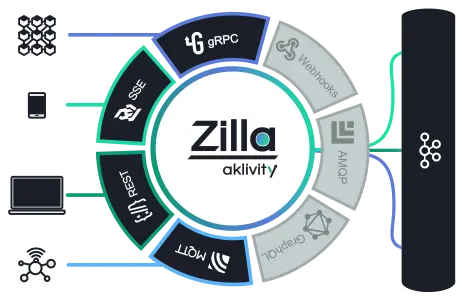Zilla Documentation
Zilla is a multi-protocol, edge and service proxy. It abstracts Apache Kafka® for non-native clients, such as browsers and IoT devices, by exposing Kafka topics via user-defined REST, Server-Sent Events (SSE), MQTT, or gRPC API entry points.

Getting Started
Zilla can validate API requests and message streams using your OpenAPI and AsyncAPI schemas. Zilla implements the OpenAPI and AsyncAPI schemas directly meaning there are little or no changes necessary to start serving you existing operations through Zilla. You can just drop in an existing OpenAPI/AsyncAPI specification and Zilla can seamlessly integrate with your current API management workflows and tooling.
You can see a working Petstore Demo using OpenAPI/AsyncAPI schemas. Zilla can also define and proxy MQTT endpoints using a pair of AsyncAPI schemas. Check out the Taxi Demo to see a Zilla MQTT proxy defined using AsyncAPI, which is deployed Live using Kubernetes.
You can explicitly define your APIs in a Zilla configuration by carefully orchestrating all of the different Bindings Zilla has to offer. You can see many of them on display by using the Kafka Proxy Quickstart or checking out the Zilla Examples repo.
Running Zilla via Docker
Run the latest Zilla release with the default empty configuration via docker.
docker run ghcr.io/aklivity/zilla:latest start -v
The output should display the Zilla config and started to know Zilla is ready for traffic.
// default Zilla config
name: default
// Zilla status
started
Specify your own zilla.yaml file.
docker run -v ./zilla.yaml:/etc/zilla/zilla.yaml ghcr.io/aklivity/zilla:latest start -v
Running Zilla via Helm
Go to the Zilla artifacthub page to find out more on how to install Zilla using Helm.
helm install zilla oci://ghcr.io/aklivity/charts/zilla --namespace zilla --create-namespace --wait \
--values values.yaml \
--set-file zilla\\.yaml=zilla.yaml
Zilla specific configuration is in the zilla.yaml file which can be included in the helm install by adding --set-file zilla\\.yaml=zilla.yaml to your command.
The zilla.yaml Config
The zilla.yaml config is declaratively configured to clearly define API mappings and endpoints that Zilla implements. This makes creating and managing different Zilla services easy.
Zilla HTTP Proxy
The Zilla HTTP Kafka Proxy lets you configure application-centric REST APIs and SSE streams that unlock Kafka event-driven architectures.
Zilla gRPC Proxy
The Zilla gRPC Kafka Proxy lets you implement gRPC service definitions from protobuf files to produce and consume messages via Kafka topics.
Zilla MQTT Proxy
The Zilla MQTT Kafka Proxy manages MQTT Pub/Sub connections and messages on and off of Kafka.
Zilla Plus
Everything in OSS plus commercial integrations and enterprise support. Partner-certified solutions for Confluent Cloud, Redpanda, and AWS MSK. Check out the Product Website and find detailed instructions for each of our markeplace offerings below.
Amazon MSK Secure Public Access
This allows Kafka clients from outside the private network access to the full functionality of your Amazon MSK cluster.
Confluent Cloud Secure Public Access
This allows Confluent and Kafka clients from outside the private network access to the full functionality of your Confluent Cloud cluster.
Amazon MSK IoT Access and Control
Your Amazon cluster is turned into a fully-fledged MQTT broker.
Confluent Cloud IoT Access and Control
Your Confluent Cloud cluster is turned into a fully-fledged MQTT broker.
Redpanda IoT Access and Control
Your Redpanda cluster is turned into a fully-fledged MQTT broker.

